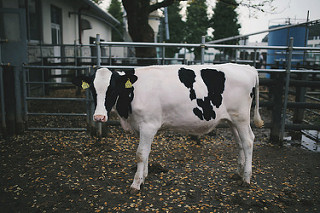 I have always enjoyed food, not just any food, but meat. My favorite meal growing up was my abuela’s bistec empanizado, a Cuban dish of breaded and fried steak with rice, black beans, and plantains. I still remember the joy in my grandmother's eyes as I devoured her home cooked meal. For my family, red meat was a treat, and for my abuela, it symbolized a certain socioeconomic status, because in Cuba (where my family emigrated from) it was a luxury. So I grew up idolizing meat and I can comfortably say that I truly enjoy the flavor, texture—well, everything about it.
I have always enjoyed food, not just any food, but meat. My favorite meal growing up was my abuela’s bistec empanizado, a Cuban dish of breaded and fried steak with rice, black beans, and plantains. I still remember the joy in my grandmother's eyes as I devoured her home cooked meal. For my family, red meat was a treat, and for my abuela, it symbolized a certain socioeconomic status, because in Cuba (where my family emigrated from) it was a luxury. So I grew up idolizing meat and I can comfortably say that I truly enjoy the flavor, texture—well, everything about it.
Then about two years ago as a college sophomore (after taking my first ever environmental studies course) I experienced Climate Depression. Yeah, that’s actually a thing! In short, it is a feeling of overwhelming anxiety, sadness and hopelessness caused by learning about climate change and really understanding the state of our planet. Knowing that my species has single handedly altered our Earth to the point that about 200 species go extinct daily is some gnarly information to let sink in. The ability to pinpoint how every facet of my lifestyle was contributing to this massive problem, but not be able to figure out how to make it better, was a struggle, and it seriously affected my mental health. Thankfully, the class wasn’t just oriented towards the horrors that lay ahead, but what we could do about it—and this is when we landed squarely on the issue close to my heart: our food system.
So how did thinking about food lift me out of my climate depression? Food is the nexus of the human environmental relationship. As human beings, we engage with food every day. Many of us can control our intake, and food depends on our environment to even exist. Where would soybeans be without sunshine and rain? Or cattle without grass? Food—the production of food—is a powerful tool to mitigate climate change, and meat in particular (that very meat used in my abuela’s dishes) is a perfect place to start...
Meat production, specifically beef, uses large amounts of water, pollutes our waterways (via cow manure), releases methane gas, and compounds bacterial resistance through the use of antibiotics. All of these factors play a major role in expediting and exacerbating climate change and harming our environment. For those reasons, I embarked on my vegan journey.
And what a journey it’s been, because let me tell you, it has not been easy and I’ve definitely made mistakes! But it feels amazing to know I’m doing something to help mitigate climate change. My abuela, seeing my love for the planet, has given me her full support! Now, when I go home, she makes me the same Cuban dishes as before—but now they are vegan! I made a change in my life that has made a dent in climate change, without leaving my family or culture behind. What changes have you made in your life? Share your thoughts in the comments section below!
If you’re interested in doing a vegan meal a week or joining the crew check out these tips.
Photo by: m_takahashi

Nia Mitchell is a recent graduate from UC Santa Barbara majoring in Interdisciplinary Environmental Justice. Her concentrations include Anthropology, Black Studies, and Environmental Science. She is NCSE’s newest summer intern. Stay tuned for more from Nia in the coming weeks.
